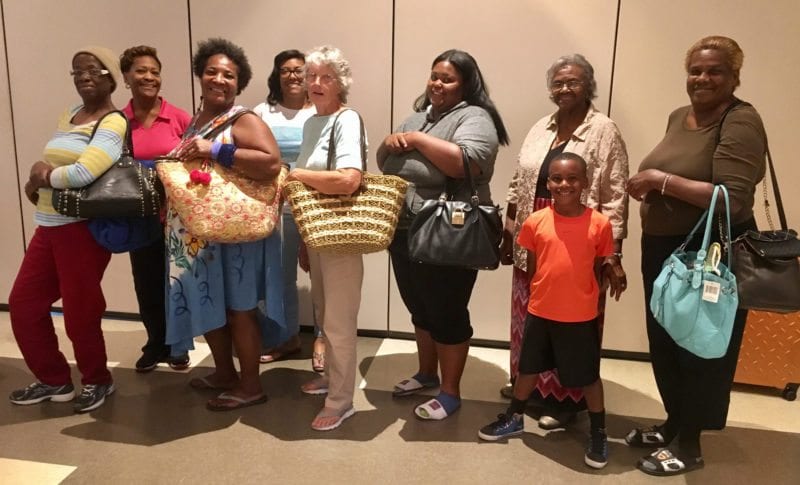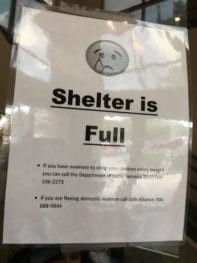HOUSES OF WORSHIP
Last Summer’s Two-Week Long Homelessness Task Force Program

Guests and their hosts at the Congregation House this past summer.
It was 90 degrees on an early evening in the middle of July and summer was coming to a near end. One by one, the women all stepped off the van with their daily items. These women spent most of their day outside in the sweltering heat. The resource room of their shelter was under renovation, the only space of refuge from the unforgivably hot weather. As they swiftly made way to their makeshift bedrooms in the Davidson College Presbyterian Church Congregation house, they greeted us with their smiles, “Hello” and “thank you.” The thought of lying on a twin bed in a moderately air-conditioned room was all they hoped for that day and for many days.
In mid-May, I had just arrived back from my study abroad in Morocco. Shortly after arriving, I had an interview for an internship position with the newly founded Homelessness Task Force of North Mecklenburg. However, once I began the interview and talked with Marcia Webster, the executive director of the Davidson Housing Coalition, and Jane Campbell, a lead volunteer of Room in the Inn, I realized that this was not just a typical interview for a summer internship. This interview was a conversation that stemmed from why homelessness and the lack of affordable housing are still issues in this country, and we brainstormed how we could collectively address these issues in our own means in North Mecklenburg county.
Charlotte’s Salvation Army Center of Hope, a women’s shelter, is built to accommodate roughly 150 homeless persons. Now, there are over 300 homeless residents in the shelter. Several months prior to the start of the internship, the shelter sent out an emergency email, seeking the assistance and partnerships from churches in the Charlotte-Mecklenburg area. Nationally, Charlotte ranks 50 out of 50 cities in which socio-economic, upward mobility is difficult, if not impossible, meaning that if one is born in poverty in Charlotte that person is most likely to remain in poverty. Mecklenburg County encompasses North Mecklenburg, an area of the county most may not associate with having any homeless persons.
“The shelter is overcrowded, all the women with their children,” one of the guests explained one night over dinner. “It’s also hard because sometimes you wouldn’t have anywhere to put your things and would have to worry about someone taking it.”
Most of the guests discussed that, since the shelter was overcrowded, it was difficult to create a comfortable place to sleep—a sleeping bag on the floor of the hallway or even the cafeteria was an alternative to an actual bed—and to hear infants and children crying each night as they try to go to sleep.
The Salvation Army reached out to Mecklenburg county churches to see who would offer their places of worship as a temporary shelter  for single women, without minors, throughout the summer of 2017. A few of the churches volunteered to turn their houses of God into a place of refuge for God’s people.
for single women, without minors, throughout the summer of 2017. A few of the churches volunteered to turn their houses of God into a place of refuge for God’s people.
At DCPC Congregation House, we had close to 100 volunteers for the entire two weeks who assisted with providing meals, cleaning the bed sheets, making a donation to replace a broken dryer so that the women could do their laundry, providing clothing, offering transportation for the women to and from Charlotte, and giving their time to have conversations and bond with the women.
On the first day of their arrival, one of the guests said that she ”felt like I am in a country club,” as she marveled at space of her room. Though the women were filled with joy and gratitude at being able to stay at the Congregation House, which provided full accommodations that suited the women’s external needs, a void was still unfilled.
I had a chance to know each of the women’s stories and that not all of them had shared a similar route to homelessness. Some had been challenged with a health emergency that forced them out of work and left them dependent, without a familial support system that was willing to assist with care. Some ended up being evicted and becoming a victim of the pervasive problem of the lack of affordable housing. Some had to seek refuge away from a situation that put their physical and emotional safety at risk and no longer had an additional form of income. Some were just trapped within the cracks of life and were trying to find a way to get out. But all of these different routes had led them to homelessness.
Oftentimes, people who are homeless are depicted as people who have made poor financial choices or poor life choices, in general. However, living with these women and hearing their life testimonies proved such depictions to be myths.
And those seven weeks of my time as the Assessment Coordinator for the Homelessness Task Force of North Mecklenburg and two weeks with these women did not remove the issue of homelessness from their lives. Some are gradually getting out of their situations and some are still stuck. This summer has revealed that this is not a singular issue but has many layers connected to other issues, such as access to healthcare, affordable housing and gentrification, and physical and mental abuse. Our mission with the Homelessness Task Force did not end here; it started here.
Zakiyyah Maryam Chism
Zakiyyah Maryam Chism is a senior Africana Studies major, Arab studies minor at Davidson College. In her early years in college, she found a love for journalism and has since strived to create her own path within the field. Maryam has written for The Davidsonian, the student newspaper at Davidson College. She is a Bonner Scholar and currently serves as a Contributing Columnist for News of Davidson.


